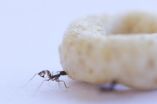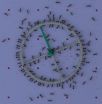Ants in the lead
2015-07-30
(Press-News.org) Anyone who has ever watched a group of ants scurrying to carry a large crumb back to their nest has probably wondered how these tiny creatures manage the task. New research at the Weizmann Institute of Science, which appeared today in Nature Communications, explains how a balance of individual direction and conformist behavior enables ants to work together to move their food to in the desired direction.
To lug a large object, a number of ants surround it - the back ones lift, those on the leading edge pull. How do they stay on track, instead of simply pulling all around in a sort of tug-of-war? Dr. Ofer Feinerman and his group in the Institute's Physics of Complex Systems Department used video analysis to track the individual movements of ants in a group that was carrying a large food item toward their nest. The more ants around the item (for, example, a breakfast cereal nugget) the faster they could move it. Although the bit of food always travelled in the general direction of the nest, its path was one of wrong turns and corrections.
In the videos, individual ants can be seen to help in carrying for a short while, after which new ants take their places. When these new ants mobilize, the other carriers, which have since become a bit confused as to the proper direction, defer to the newcomers. As a new ant attaches, the steering of the object temporarily corrects, so that the trajectory becomes better aimed toward the nest. Newly attached ants continue to lead the motion for about 10-20 seconds.Thus informed ants take the lead, but they are also quick to relinquish it once their informational edge disappears.
Together with the group of Prof. Nir Gov of the Weizmann Institute's Chemical Physics Department, a mathematical model was developed to describe this cooperative behavior. According to the model, the decisions of the "non-informed" carriers fit an intermediate level of behavioural conformism; the well informed individuals are then set to optimally steer the direction of the load. This model describes a critical point between conformism and individuality that enables the group of ants to coordinate their work and adjust their direction as needed. The model is a variation on a so-called Ising model, which is more often used to describe emergent phenomena in statistical physics.
What can this study teach us about the role of individuality within a group of social animals? Feinerman: "In this system, the wisdom does not come from crowds. Rather, some individuals supply the 'brains,' and the role of the group is to amplify the 'muscle' power of savvy individuals so that they can actually move the load."
INFORMATION:
Videos taken during the research:
https://www.youtube.com/watch?v=IfKiTaw8ndI
https://www.youtube.com/watch?v=JAwzXEZcjIw
https://www.youtube.com/watch?v=isnQrT_o5L8
Dr. Ofer Feinerman's research is supported by the Yeda-Sela Center for Basic Research; the Clore Foundation; and the Tom Beck Research Fellow Chair in the Physics of Complex Systems. Dr. Feinerman is the incumbent of the Shlomo and Michla Tomarin Career Development Chair.
Prof. Nir Gov's research is supported by the Yeda-Sela Center for Basic Research. Prof. Gov is the incumbent of the Lee and William Abramowitz Professorial Chair of Biophysics.
The Weizmann Institute of Science in Rehovot, Israel, is one of the world's top-ranking multidisciplinary research institutions. Noted for its wide-ranging exploration of the natural and exact sciences, the Institute is home to scientists, students, technicians and supporting staff. Institute research efforts include the search for new ways of fighting disease and hunger, examining leading questions in mathematics and computer science, probing the physics of matter and the universe, creating novel materials and developing new strategies for protecting the environment.
ELSE PRESS RELEASES FROM THIS DATE:
2015-07-30
That is the conclusion of a major new review, written by leading world experts and published in the medical journal, Addiction. The review examined a wide range of measures that healthcare systems in different countries can adopt to help smokers to stop. It reviewed how effective they are and how much they cost, and offers a new tool to help governments and healthcare administrators calculate the cost - and affordability1 - of stop smoking treatments.
The main findings of the review were:
"Cytisine", a medicine currently only found in a few mostly Eastern European ...
2015-07-30
New research by scientists at the University of York has given tea and coffee drinkers new information about why their favourite drinks taste as they do.
The study led by Dr Seishi Shimizu, of the York Structural Biology Laboratory in the University's Department of Chemistry, shows that sugar has an important effect in reducing the bitterness of tea and coffee, not just by masking it but by influencing the fundamental chemistry.
The research published in Food and Function reveals new insights into the way in which caffeine, sugar and water interact at the molecular ...
2015-07-30
New research in the Open Access journal GigaScience presents a virtual package of data for biogas production, made reusable in a containerized form to allow scientists to better understand the production of biofuels.
One of the promising areas in biofuels development is biogas, which has huge potential as a renewable and clean source of energy. Biogas is the production of methane gas through the anaerobic digestion (fermentation) of organic matter such as agricultural or food waste. Detailed knowledge on the functioning of the fermentation process is key for optimizing ...
2015-07-30
A new blood test could help emergency room doctors quickly diagnose traumatic brain injury and determine its severity. The findings, published July 10 in the Journal of Neurotrauma, could help identify patients who might benefit from extra therapy or experimental treatments.
"Compared to other proteins that have been measured in traumatic brain injury, BDNF does a much better job of predicting outcomes," says Frederick Korley, M.D., Ph.D., an assistant professor of emergency medicine at the Johns Hopkins University School of Medicine and first author of the new paper.
After ...
2015-07-30
Philadelphia, July 30, 2015 - In a new national survey of chronic obstructive pulmonary disease (COPD) patients, Health Union reveals a surprising lack of awareness of risk factors and knowledge of diagnosis stage among patients. Results demonstrate a severe impact on quality of life, employment, and ability to afford treatment.
COPD, the third most common cause of death in the United States, describes a group of lung conditions that severely impact the breathing of nearly 15 million people in the U.S. (or six percent of the population) and more than 65 million worldwide. ...
2015-07-30
WASHINGTON, DC, July 28, 2015 -- Recent research has shown that racial segregation in the U.S. is declining between neighborhoods, but a new study indicates that segregation is manifesting itself in other ways -- not disappearing.
"We just can't get too excited by recent declines in neighborhood segregation," said lead author Daniel Lichter, the Ferris Family Professor in the Department of Policy Analysis and Management and a professor in the Department of Sociology at Cornell University. "The truth is neighborhood segregation still remains high in America, and our study ...
2015-07-30
This news release is available in French. By blocking the expression of a certain gene in patients, University of Montreal researchers have contributed to the demonstration of great decreases in the concentration of triglycerides in their blood, even in various severe forms of hypertriglyceridemia and regardless of the base values or the treatment the patient usually receives. The gene in question codes for the apoC-III protein. "Our study suggests that the proteine apoC-III plays a key role in the management of triglycerides. Triglycerides, like cholesterol, are lipids. ...
2015-07-30
URBANA, Ill. - With many types of cancers, early detection offers the best hope for survival. However, research into new early-detection screenings, as well as possible interventional radiology and surgical treatments, has been hindered by the lack of a large animal model that would accurately reflect the types of cancers seen in human cells.
For the last several years, researchers at the University of Illinois interested in improving screening programs for cancer have studied gene expression in mice, humans, and pigs in an effort to create a large-animal model that ...
2015-07-29
Support for eliminating existing exemptions, except for medical reasons, from immunization laws was among the policy recommendations adopted last weekend at the summer meeting of the Board of Regents of the American College of Physicians (ACP).
"Allowing exemptions based on non-medical reasons poses a risk both to the unvaccinated person and to public health," said Wayne J. Riley, MD, MPH, MBA, MACP, president of ACP,
"Intentionally unvaccinated individuals can pose a danger to the public, especially to individuals who cannot be vaccinated for medical reasons."
The ...
2015-07-29
A targeted therapy already used to treat advanced skin cancer is also effective against the most common subtype of the brain tumor medulloblastoma in adults and should be considered for treatment of newly diagnosed patients, according to research led by St. Jude Children's Research Hospital.
The drug, called vismodegib, is designed to block a key protein in the sonic hedgehog (SHH) signaling pathway. The pathway is normally active during fetal development and is inappropriately switched on in about 30 percent of medulloblastoma tumors, including about 60 percent of tumors ...
LAST 30 PRESS RELEASES:
[Press-News.org] Ants in the lead



